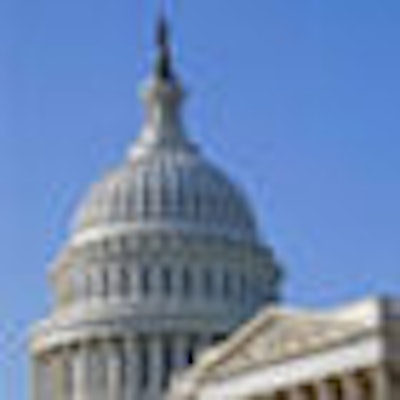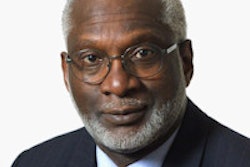
The rain in Washington, DC, last week didn't dampen the mood as oral health advocates gathered on Capitol Hill to celebrate the 10th anniversary of the report "Oral Health in America: A Report of the Surgeon General."
Co-hosted by Oral Health America (OHA) and the Dental Trade Alliance (DTA), the September 29 reception featured brief remarks by key oral health proponents as well as two award presentations.
But the star of the evening was the report itself and the progress that has been made since it first came out. Described as a landmark in oral healthcare when it was released in 2000, the report drew attention to America's "silent epidemic" of oral disease and focused a lens on actions needed to improve oral health in the U.S.
While much progress has occurred in the past decade, the evening's speakers noted that more work is needed, especially in the areas of access to care for children and underserved populations and in education to promote oral health. Another critical area is ensuring that the oral health provisions in the Affordable Health Care for America Act are funded.
Expanded federal efforts
Rear Admiral William Bailey, D.D.S., M.P.H., newly appointed assistant surgeon general and chief dental officer with the U.S. Public Health Service, praised the surgeon general's report for increasing access to care, strengthening infrastructure of state oral health programs, increasing delivery of evidence-based interventions, and expanding the safety net. But he also noted that attendees must continue their advocacy work because "we are far from achieving our goal of oral health in the U.S."
— Rear Admiral William Bailey, D.D.S., M.P.H., chief dental officer, U.S. Public Health Service
Dr. Bailey noted that several federal activities will boost oral health efforts. At the U.S. Department of Health and Human Services (HHS), the revitalized Oral Health Coordinating Committee has developed an outreach program to promote oral health and is encouraging nonfederal organizations to participate with the committee. He also gave a nod to the HHS Oral Health Initiative 2010, a collection of nine interagency programs aimed at increasing access to care, eliminating oral health disparities, and promoting disease prevention.
Rochelle Rollins, Ph.D., M.P.H., director of the Division of Policy and Data, HHS Office of Minority Health, also touched on the Oral Health Initiative 2010 and noted that the surgeon general's report "is a foundation document for what's happening in our department and across our department."
Oral health is just beginning to be seen as a collaborative event, she added.
"Agencies haven't worked together and have not reached out in a collective way to stakeholders of the oral health community, but that's changing," she said. "We're making things happen. We need you to stay involved."
Access for children and vulnerable communities
Rep. Elijah Cummings (D-MD) brought emotion to the podium when he described the driving force behind his commitment to promoting oral health and access for all. He shared the story of 12-year-old Diamonte Driver, who died three years ago because his mother could not afford the $80 to remove his decaying tooth and couldn't find a provider that would take Medicaid.
Cummings drew a stark picture of those unable to afford or find oral healthcare. Urban and rural areas are particularly affected because they are less likely to have dental services available in community-based health centers.
"So many [children] miss so many days from class from pain it's unconscionable," he said. "We as a country can do better, we must do better." He noted that "with the provisions in the Affordable Care Act, pediatric dentistry will no longer be an afterthought."
Cummings gave the audience some advice on promoting the message of oral health as he closed his talk. "The squeaky wheel gets the attention," he said. "We [in Congress] have so many issues vying for attention that it is those issues where folks come out and push hard where the results come. Continue to have the vision that all of our children can have excellent dental care and continue to act on that vision."
In the evening's first award ceremony, George Blue Spruce Jr., D.D.S., M.P.H., assistant dean for American Indian Affairs at the Arizona School of Dentistry and Oral Health, received the OHA's Marvin Goldstein Outstanding Volunteer Award for his volunteer leadership in efforts to improve oral health among Native American and American Indian peoples. Carol Grant, director of the National Center for Indian Health Professions, accepted the award on behalf of Dr. Blue Spruce.
In the second presentation, the boards of directors for the OHA and the DTA recognized Sen. Jeff Bingaman (D-NM) for his long-time support of oral health initiatives at both national and state levels. In accepting the award on the senator's behalf, Frederick Isasi, Bingaman's senior legislative counsel for healthcare, noted that the Affordable Care Act for the first time integrates oral healthcare with healthcare coverage. The act includes many investments in oral healthcare programs, including "the most important step forward in oral health surveillance in decades," he said.
Isasi rallied the room when he emphasized that the fight is not over. "The next step we need is to make sure that the authorizations we got are funded," he said. "When talking to representatives and administration, you have to tell them what's in that law, how important it is, and make sure it gets funded."
Convincing the public
The reception closed with Gary Price, DTA CEO, sharing a key finding from the 2010 oral health survey sponsored by DTA, OHA, and Plackers. He noted that while access to oral healthcare is critical to health, an equally critical component is oral health literacy. The study found that four in 10 children received oral health education in school, but the flip side is that six in 10 did not.
"It should be a goal of everyone in this room to take [oral health literacy] as a mission," he said. "Each of us has to commit ourselves to leaving this room and finding another person to convince that oral health is important to overall health. The key to our success will eventually be to convince the public."
Susan M. Reiss is a freelance writer with 20 years experience covering federal science policy, biomedical imaging and bioengineering, and emerging pharmaceuticals and medical devices. Early in her career she was managing editor of the Optical Society of America’s Optics & Photonics News. She lives in Arlington, VA.
Copyright © 2010 DrBicuspid.com



















